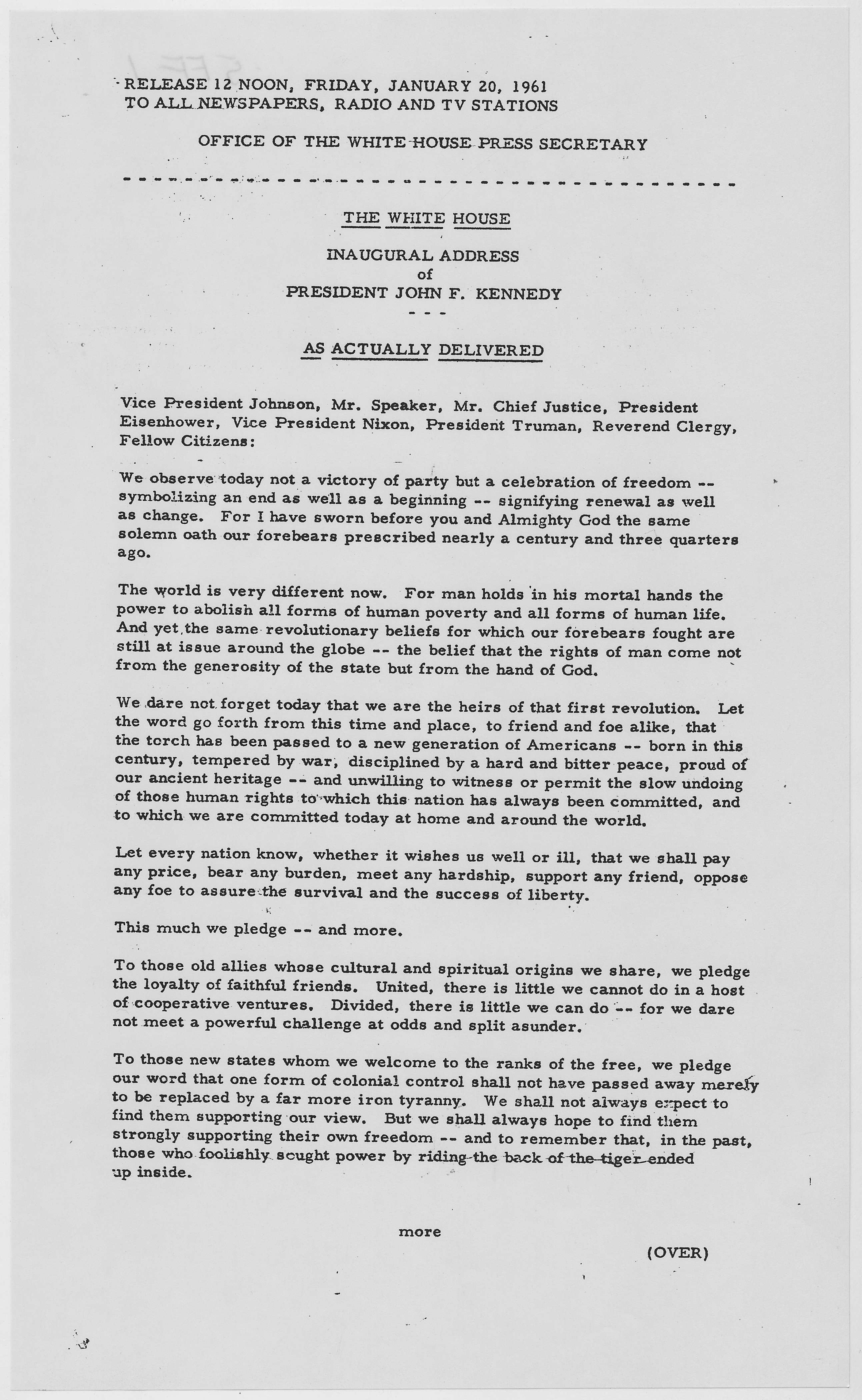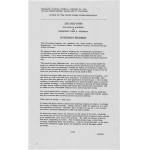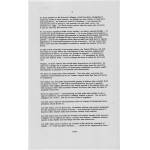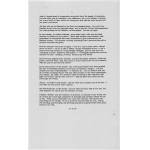Press Copy of President John F. Kennedy's Inaugural Address
1/20/1961
Add to Favorites:
Add all page(s) of this document to activity:

Add only page 1 to activity:
Add only page 2 to activity:
Add only page 3 to activity:
President John F. Kennedy delivered his inaugural address on January 20, 1961, announcing that "we shall pay any price, bear any burden, meet any hardship, support any friend, oppose any foe to assure the survival and success of liberty." This is a press copy of Kennedy's inaugural address "as actually delivered."
The inaugural ceremony is a defining moment in a president’s career — and no one knew this better than John F. Kennedy as he prepared for his own inauguration on January 20, 1961. He wanted his address to be short and clear, devoid of any partisan rhetoric and focused on foreign policy.
Kennedy began constructing his speech in late November, working from a speech file kept by his secretary and soliciting suggestions from friends and advisors. He wrote his thoughts in his nearly indecipherable longhand on a yellow legal pad.
While his colleagues submitted ideas, the speech was distinctly the work of Kennedy himself. Aides recounted that every sentence was worked, reworked, and reduced. The meticulously crafted piece of oratory dramatically announced a generational change in the White House. It called on the nation to combat "tyranny, poverty, disease, and war itself" and urged American citizens to participate in public service.
The climax of the speech and its most memorable phrase – "Ask not what your country can do for you – ask what you can do for your country" – was honed down from a thought about sacrifice that Kennedy had long held in his mind and had expressed in various ways in campaign speeches.
Less than six weeks after his inauguration, on March 1, President Kennedy issued an executive order establishing the Peace Corps as a pilot program within the Department of State. He envisioned the Peace Corps as a pool of trained American volunteers who would go overseas to help foreign countries meet their needs for skilled manpower. Later that year, Congress passed the Peace Corps Act, making the program permanent.
The inaugural ceremony is a defining moment in a president’s career — and no one knew this better than John F. Kennedy as he prepared for his own inauguration on January 20, 1961. He wanted his address to be short and clear, devoid of any partisan rhetoric and focused on foreign policy.
Kennedy began constructing his speech in late November, working from a speech file kept by his secretary and soliciting suggestions from friends and advisors. He wrote his thoughts in his nearly indecipherable longhand on a yellow legal pad.
While his colleagues submitted ideas, the speech was distinctly the work of Kennedy himself. Aides recounted that every sentence was worked, reworked, and reduced. The meticulously crafted piece of oratory dramatically announced a generational change in the White House. It called on the nation to combat "tyranny, poverty, disease, and war itself" and urged American citizens to participate in public service.
The climax of the speech and its most memorable phrase – "Ask not what your country can do for you – ask what you can do for your country" – was honed down from a thought about sacrifice that Kennedy had long held in his mind and had expressed in various ways in campaign speeches.
Less than six weeks after his inauguration, on March 1, President Kennedy issued an executive order establishing the Peace Corps as a pilot program within the Department of State. He envisioned the Peace Corps as a pool of trained American volunteers who would go overseas to help foreign countries meet their needs for skilled manpower. Later that year, Congress passed the Peace Corps Act, making the program permanent.
This primary source comes from the Collection JFK-3: Papers of John F. Kennedy: Presidential Papers: President's Office Files.
National Archives Identifier: 193870
Full Citation: Press Copy, Inaugural address of President John F. Kennedy; 1/20/1961; Inaugural address, 20 January 1961; Speech Files, 1961 - 1963; Collection JFK-3: Papers of John F. Kennedy: Presidential Papers: President's Office Files; John F. Kennedy Library, Boston, MA. [Online Version, https://docsteach.org/documents/document/inaugural-address-jfk, April 19, 2024]Activities that use this document
- Magna Carta's Influence on America
Created by the National Archives Education Team
Rights: No Known Copyright Learn more on our privacy and legal page.






